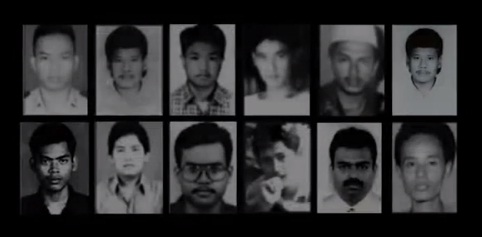They disappeared 14 years ago. Without words. Leaving families and friends behind, questioning who took them away. Who took the voice, the smile, the laughter, the warmth of their beloved ones away? What will the abductors feel if it was their families who were taken away?
Between 1997 and 1998 in Indonesia, 23 activists were taken by the elite special forces of the Army. Nine lucky ones were released — Desmond Junaidi Mahesa, Haryanto Taslam, Pius Lustrilanang, Faisol Reza, Rahardjo Walujo Djati, Nezar Patria, Aan Rusdianto, Mugianto and Andi Arief. Leonardus Gilang was found dead. 13 others are still missing — Petrus Bima Anugrah, Herman Hendrawan, Suyat, Wiji Thukul, Yani Afri, Sonny, Dedi Hamdun, Noval Al Katiri, Ismail, Ucok Siahaan, Hendra Hambali, Yadin Muhidin, and Abdun Nasser.

The relatives of the victims are determined to search for them. The National Commission of Human Rights has investigated the case and recommended an ad hoc human rights court. But no such thing happened. The low level army soldiers were only tried in the military court. The generals continue their lives unscathed, as if nothing happened — they even became politicians, and one is targeting to be the next president. Four presidents after Soeharto did no significant thing to actually find the missing 13.
They are nowhere to be found. Yet.
Today is the International Day of the Victims of Enforced Disappearances. We stand up together to refuse to forget, and we demand the return of the disappeared ones to the families. And we do not want the same tragedy to happen to anyone else.
Indonesian civil society is launching a campaign to demand the return of the activists. The campaign is titled “14 tahun hilang” — lost for 14 years. Please support it by signing the petition, tweeting it, or share it on facebook. Because one day without knowing the whereabouts of your beloved ones is already bad enough, imagine how it feels to have it for years!
Poet Wiji Thukul, who is one of the missing people, once wrote these lines:
“Aku pasti pulang.
Mungkin tengah malam dini, mungkin subuh hari.
Pasti, dan mungkin, tapi jangan kau tunggu..”
“I will come home.
Maybe at midnight, maybe at dawn.
I will, and I may, but don’t you wait..”
There are many victims of enforced disappearances all over the world. What is your story?
